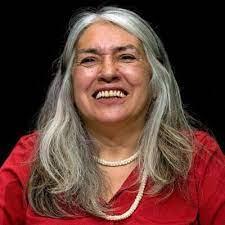 |
|
| Lee Maracle | |
Author Lee Maracle, "who chronicled the effect of Canadian settlement on the land's Indigenous people and the persistence of discrimination, only to find herself in recent years championed by the very cultural and political establishment that she had spent her career attacking," died November 11, the New York Times reported. She was 71. "She tried to capture, in writing, the oral traditions of the Sto:lo, Squamish and Métis people she descended from, while at the same time describing how a history of brutality had shaped her emotional life and outlook."
Before Bobbi Lee: Indian Rebel, an autobiographical novel, was published in 1975, publishers had rejected an earlier manuscript by Maracle, telling her, "Indians can't read." The Times noted that after writing Bobbi Lee, she "collected signatures from 3,500 Indigenous people who said they would buy the book--she had heard that 3,500 sales constituted a bestseller in Canada. A small press agreed to print it."
After the Vancouver Writers Festival declined her request to launch I Am Woman at the event during the late 1980s, Maracle jumped onstage and began reading anyway. "The festival officials were horrified," she said in a 2019 profile in the Globe and Mail. But, she added, "leadership changed, and Indigenous writers began getting invitations to the festival." Her other books include Celia's Song; Ravensong; I Am Woman; and Bent Box.
Noting that in recent years the Canadian government has finally begun to institute some changes across the country, the Times wrote that an official investigation into missing or murdered Indigenous women has been launched. The government has also created a Truth and Reconciliation Commission focused on the estimated 150,000 Indigenous children who were separated from their families to attend assimilationist residential schools, the last of which closed in the late 1990s.
Maracle "was before the reckoning," Daniel Justice, a professor of Indigenous literature at the University of British Columbia, said. "She was one of the voices that helped herald the reckoning and was ceaseless in her commitment to that."
Waubgeshig Rice, an Anishinaabe Canadian journalist and author who co-hosts a podcast about Indigenous writing, said Maracle was among the first writers about Indigenous life he had ever read, and that the experience had made a lasting impact: "She carried stories of her people very responsibly and very effectively and proudly, and it inspired me to explore that way to tell stories. I can't think of anybody who hasn't been influenced by her in some way."
By the end of her life, Maracle "no longer needed to whip up a petition or jump onstage to get attention," the Times noted. In 2017, she was awarded the Order of Canada for being "one of the most influential Indigenous voices in Canada's literary landscape." In a subsequent interview with North Shore News, she reflected that "to accept something from Canada for the work that I do with decolonization struck me as a bit odd."

